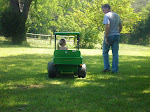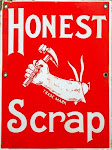HEAT STRESS > ANHIDROSIS > HEAT STROKE
We are going on a week straight of record breaking high temperatures here on the East Coast....as I was driving home @ 730pm from work yesterday the temperature gauge in my truck was registering at a whopping 100 degrees still! As uncomfortable as the heat us for me and many others, it is the pets that often silently suffer even greater.
We have been rinsing the horses and dogs down daily to provide a little relief and checking them for heat stress at every feeding...still, dangerous situations can happen in the blink of an eye so it is important to be diligent in assessing your pets stress levels in this extreme weather....
Case in point: Three days ago I fed the horses as usual....I noticed that my mother had pulled fly sheets off of 2 of the 3 horses in one pasture...the third, Martin, still had his on....they all came to their feed buckets and appeared happy and healthy....I debated whether to remove Martin's fly sheet too, but determined that since he did not appear to be sweating a lot from it that he would probably prefer the relief from the biting insects that the other 2 were dealing with....a few hours later, however, one of my fabulous borders was out tending her horses and noticed Martin panting vigorously....she pulled him in the barn immediately and noticed that when she pulled off his fly sheet he was not sweating at all...she quickly proceeded to cool him down starting with tepid water and working to cooler water until he was breathing normally again...
HEAT STRESS is REAL & COMMON under these weather conditions....what Martin appears to be suffering from is heat stress induced ANHIDROSIS.
What is Known About Anhidrosis
After this incident, I began researching this ailment and I discovered the following:
- Anhidrosis affects approximately one in five horses.
- It can affect horses of all breeds and all ages.
- It is thought to be triggered by stress - exercise, heat etc.
- It can come on suddenly, or develop over a period of time.
- It can vary in severity - from a horse which sweats a little, especially under the saddle and between the hind legs, to one whose coat remains completely dry.
- The horse's normal body temperature is between 99.5 to 101 degrees and can reach as high as 104 after a strenuous workout.
- In a normal horse, the temperature and respiration return to near normal fairly quickly after exercise. In a horse with anhidrosis, the horse's body temperature and respiration will stay dangerously high, risking heat stroke unless steps are taken to help him cool down.
The only sure fire way to avoid anhidrosis is to move to a cooler climate! Since that is not an option, I have researched ways in which I could keep Martin more comfortable:
- In severe cases, it is best to keep the horse stabled in a well ventilated barn, preferably with a fan to circulate the air and help the horse's system regulate itself. Night turn out is a good option for these horses.
- Less severe cases can be turned out during the day, provided there is plenty of shade. A pond in the pasture is a plus.
- Electrolytes, while very helpful to horses who sweat normally, won't be of much use to a horse with anhidrosis. However, they have been known to encourage sweating if the anhidrosis is accompanied by a potassium deficiency. They won't hurt the horse anyway, and may even help, so if you want to, go ahead and use electrolytes.
- Restrict exercise to the cooler hours in the morning or evening. Allow the horse plenty of cool-down periods at walk and monitor his respiration recovery during these periods.
- Cooling the horse by splashing water over the body, neck and legs, such as we have been doing, help the horse's system cool down. As the heat from the horse's body is transferred to the water, scraping it off and splashing with more water will speed the cooling process.
Consult Your Veterinarian!
The notes I have made here are not meant to replace veterinary care. If you suspect that your horse suffers from anhidrosis, consult your veterinarian. He/She will be able to make an detailed assessment of the severity of the case and will advise you accordingly.
It is interesting to note that I have read several case studies online about horses with anhidrosis that transition from sweating to not sweating depending on their stress levels. This tells me that Martin may not suffer indefinitely, but only time will tell. I am no longer going to be taking him to shows in the summer. I prefer to avoid the stress of warming up and competing in the midday heat, for his sake.....unless his condition changes.
Please watch your pets closely in this heat!
Happy Trails,
Leah









0 comments:
Post a Comment